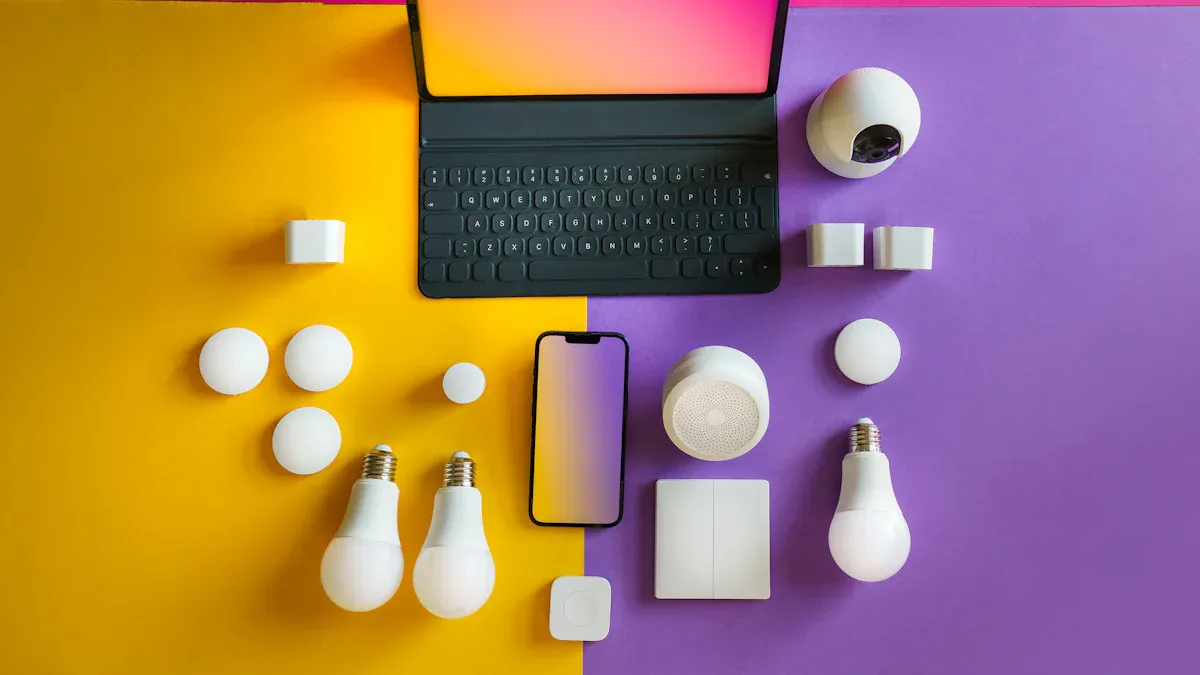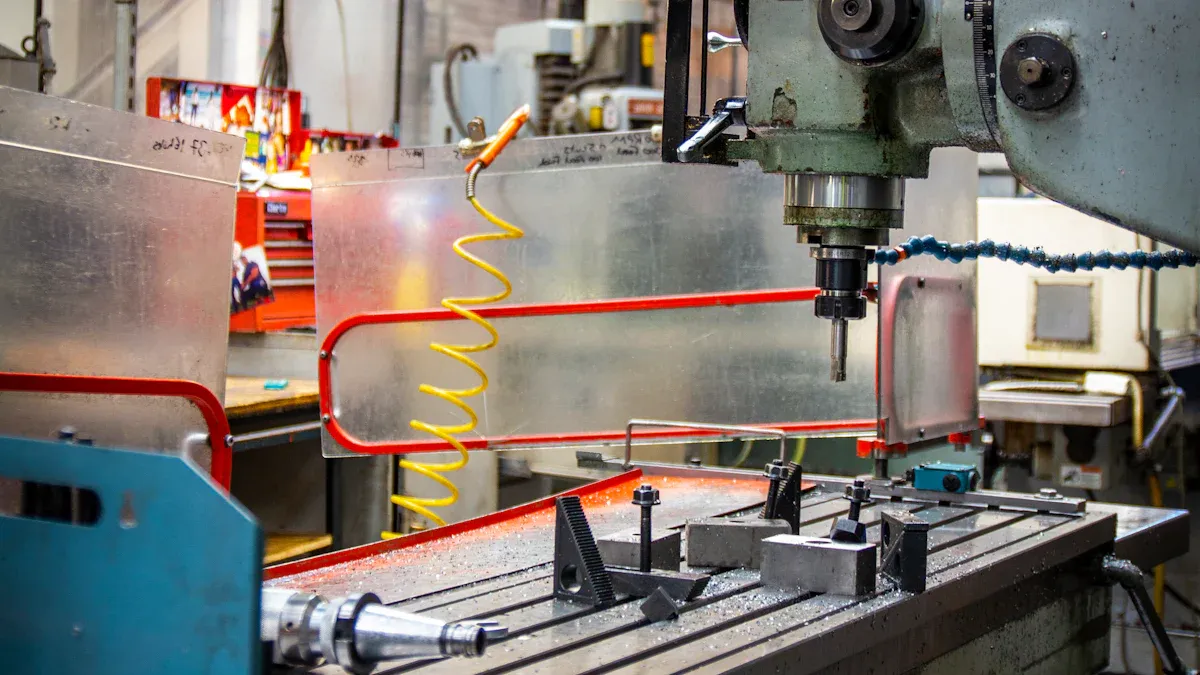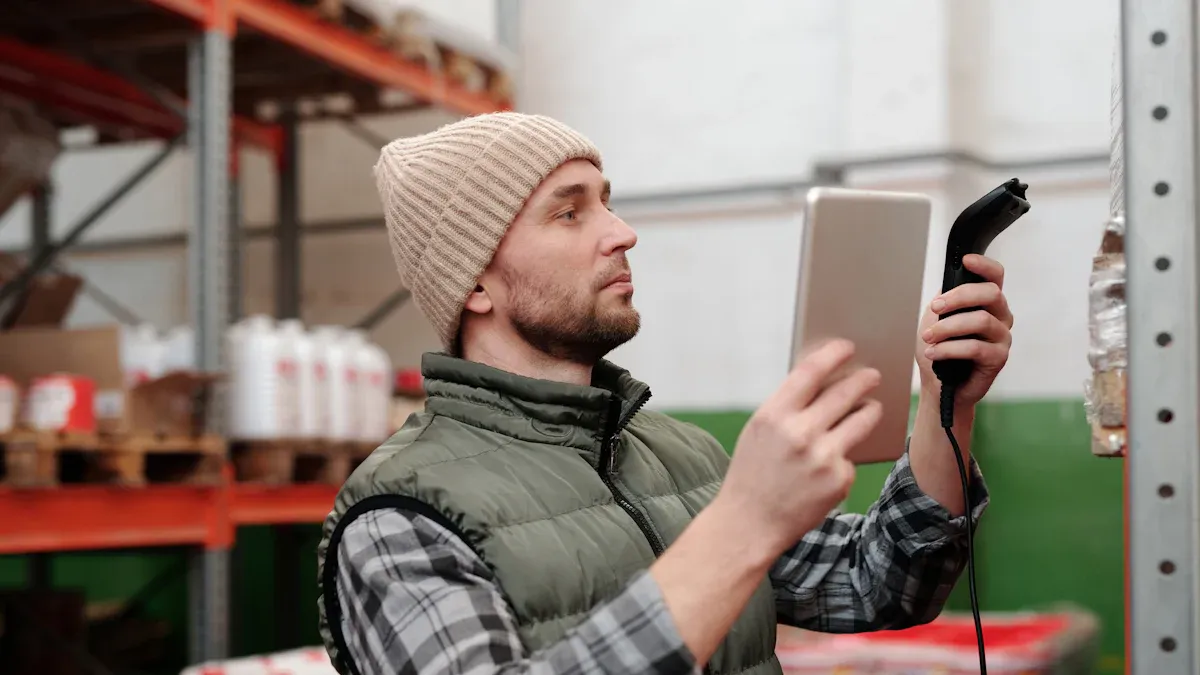Revolutionizing Medical Device Design with CNC Prototyping in 2025

The demand for innovation in medical device manufacturing continues to rise. You see this in the growing need for specialized care driven by an aging population and the emergence of personalized diagnostics. CNC prototyping has revolutionized this field by automating machining processes. It enables the creation of precise, complex components, improving outcomes in areas like implants and minimally invasive surgery.
Key Takeaways
CNC prototyping improves making medical devices with great accuracy and speed. It helps test and change designs quickly.
Using CNC machines shortens development time and lowers costs. This helps companies create new medical tools faster.
CNC prototyping works with many materials. It ensures devices are safe and work well.
Understanding CNC Prototyping in Medical Device Manufacturing

What is CNC Prototyping?
CNC prototyping refers to the use of Computer Numerical Control (CNC) machines to create prototypes for various applications, including medical device manufacturing. These machines operate with exceptional precision, guided by computer-aided design (CAD) files. You can rely on CNC prototyping to produce intricate designs with micrometer-level accuracy, which is essential for medical devices. This technology supports a wide range of materials, such as aluminum and medical-grade polymers, making it suitable for diverse medical applications. Additionally, CNC prototyping enables rapid reproduction of complex geometries, which is critical for developing innovative medical devices.
The Role of CNC Prototyping in Medical Device Prototyping
CNC prototyping has transformed medical device prototyping by offering unmatched speed, precision, and versatility. Unlike traditional methods, which often involve lengthy setup times and imprecise results, CNC machining allows you to create high-precision prototypes quickly.
CNC machining expedites the process and improves efficiency by harnessing precision, speed, and versatility. It enables rapid iteration and refinement of designs, allowing engineers to test and validate concepts faster than ever before.
This capability ensures that you can refine designs efficiently, reducing development cycles and improving patient outcomes. CNC machines also consistently hold tight tolerances, often down to +/- 0.005 inches (0.127 mm), ensuring the reliability of medical device prototypes.
Why CNC Prototyping is Critical in 2025
In 2025, advancements in CNC prototyping technology make it indispensable for medical device manufacturing. Hybrid machines now combine CNC precision with 3D printing flexibility, enabling the creation of complex geometries while reducing material waste. Software improvements enhance precision and efficiency, while automation increases productivity by minimizing manual tasks. Multi-axis machining allows you to create intricate parts, and the integration of AI with CNC systems boosts capabilities further. These advancements not only accelerate prototyping but also ensure environmental sustainability, aligning with modern manufacturing goals.
CNC prototyping addresses the growing demand for customized medical solutions. It ensures better-fitting implants, reduces complications, and contributes to faster recovery times for patients. By accelerating development cycles and enhancing design flexibility, CNC prototyping plays a vital role in improving patient care and outcomes.
Benefits of CNC Prototyping for Medical Device Manufacturers
Precision and Accuracy in Medical Device Prototyping
CNC prototyping delivers unmatched precision and accuracy, which are critical in medical device manufacturing. You can achieve tolerances as low as ±0.001 mm, ensuring that every component meets stringent medical standards. This level of precision is essential for patient safety and the functionality of devices like implants and surgical tools. CNC machines also excel at fabricating intricate components with tight tolerances, ensuring prototypes closely match their intended designs. This capability allows you to test and refine devices with confidence, knowing they will perform reliably in clinical settings.
CNC machining’s precision machining capabilities make it indispensable for creating complex medical devices. It ensures that every part fits together perfectly, reducing the risk of errors during assembly.
Accelerating the Design-to-Production Process
CNC prototyping significantly reduces the time it takes to transition from design to production. You can quickly convert digital CAD models into physical prototypes, enabling faster testing and iteration. This rapid turnaround allows you to identify and correct design flaws early, saving valuable time. By streamlining the prototyping process, CNC machining enhances production efficiency and shortens time-to-market, which is crucial in the competitive medical industry.
Rapid prototyping facilitates quicker testing and validation.
Engineers can refine designs efficiently, ensuring faster development cycles.
CNC machining supports iterative testing, helping you meet regulatory requirements faster.
Cost-Effectiveness and Iterative Design
CNC prototyping offers a cost-effective solution for medical device manufacturers. Its precision reduces material waste, lowering production costs. You can also produce multiple prototype versions quickly, enabling iterative design without significant expense. This efficiency minimizes overhead costs and ensures that adjustments can be made without delaying the project timeline. Outsourcing CNC prototyping further reduces costs by eliminating the need for in-house equipment and expertise.
Material Versatility for Complex Medical Devices
CNC machining supports a wide range of materials, making it ideal for creating complex medical devices. Metals like titanium and stainless steel provide strength and biocompatibility, while advanced plastics like PEEK and polycarbonate offer versatility and durability. This material flexibility allows you to tailor devices to specific medical applications, ensuring they meet both functional and safety requirements. CNC machines also excel at creating intricate geometries, enabling the development of advanced medical technologies.
Metals: Titanium for implants, stainless steel for surgical tools.
Plastics: PEEK for implants, polycarbonate for housings.
Ceramics: Alumina for dental implants, zirconia for crowns.
The ability to work with diverse materials ensures that CNC prototyping meets the unique demands of the medical field, from diagnostic equipment to life-saving implants.
Driving Innovation and Compliance with CNC Prototyping
Supporting Iterative Design and Rapid Prototyping
CNC prototyping empowers you to innovate faster by supporting iterative design and rapid prototyping. Traditional manufacturing methods often involve lengthy setup and tooling processes, which slow down development. CNC machining eliminates these delays, allowing you to quickly test and validate concepts. This speed is crucial in the medical field, where timely innovation can directly improve patient care.
The flexibility of CNC machines enables you to create complex geometries and intricate features that are difficult to achieve with conventional techniques. This adaptability allows you to refine designs based on feedback from stakeholders, ensuring the final product meets clinical needs. For example, CNC prototyping makes it possible to develop patient-specific implants and customized surgical tools, addressing unique medical challenges effectively. By reducing development time, CNC machining helps you bring innovative solutions to market faster, ultimately enhancing patient outcomes.
Ensuring Regulatory Compliance in Medical Device Manufacturing
Meeting regulatory standards is essential in medical device manufacturing, and CNC prototyping simplifies this process. It ensures compliance with ISO 13485 by maintaining high-quality manufacturing processes and product safety. CNC machines integrate advanced inspection tools, such as coordinate measuring machines (CMMs), to verify dimensions and tolerances. These tools ensure every component adheres to strict ISO and FDA requirements.
Aspect | Description |
|---|---|
Regulatory Standards | Compliance with ISO 13485 ensures high-quality manufacturing processes and product safety. |
Quality Assurance Processes | Rigorous in-process inspections help maintain quality and consistency throughout production. |
Material Traceability | Detailed records of material sourcing and usage ensure accountability and compliance with regulations. |
Documentation Protocols | Comprehensive documentation supports adherence to quality standards and regulatory compliance. |
Product Safety and Efficacy | Stringent quality control measures minimize risks, ensuring the safety of medical devices. |
Prototyping also allows you to test devices early in the development process, reducing the risk of rejection during regulatory reviews. This early testing helps identify and resolve potential issues, ensuring your devices meet safety and efficacy standards.
Enabling Early Market Validation and Feedback
CNC prototyping accelerates innovation by enabling early market validation and feedback. Rapid prototyping allows you to produce and test design iterations quickly, helping you identify and correct flaws before full-scale production. This process not only saves time but also ensures your devices meet user needs.
Prototyping lets you gather feedback from users and stakeholders.
Testing prototypes with real users helps identify usability issues and areas for improvement.
You can take prototypes directly to clients, allowing them to evaluate features and functionality.
By incorporating feedback early, you can refine your designs to better align with market demands. This approach ensures your devices are both functional and user-friendly, giving you a competitive edge in the healthcare sector. Faster design cycles also help you respond to evolving clinical needs, bringing innovative medical devices to market more efficiently.
Real-World Application of CNC Prototyping

Case Study: Developing a Next-Generation Surgical Tool
CNC prototyping has played a pivotal role in advancing health tech by enabling the creation of next-generation surgical tools. You can see its impact in the rapid prototyping services it provides, allowing engineers to quickly design and test surgical instruments. This process ensures that tools meet exact specifications, which is critical for their effectiveness and safety during procedures. For example, CNC swiss turning allows for the precise crafting of intricate components, ensuring high-quality components for surgical applications.
By leveraging CNC machining, you can customize medical devices to meet specific surgical needs. This customization supports the development of innovative solutions, such as patient-specific instruments or tools designed for minimally invasive procedures. Early-stage prototypes often rely on 3D printing design services, but as designs progress, CNC machining takes over to achieve the micrometer-level accuracy required for complex geometries. This transition ensures that the final product aligns with the stringent demands of modern healthcare technology.
How CNC Prototyping Streamlined the Design and Approval Process
CNC prototyping simplifies the design and approval process by streamlining key steps. First, you can create multiple CAD designs to explore different ideas. Once a design is approved, it is transformed into a 3D file for CNC machines. The next step involves identifying the manufacturing sequence, followed by CNC programming to automate the machining process. Finally, the prototype is created with precise specifications and tested for functionality.
This iterative process allows you to refine designs efficiently. If a prototype fails testing, you can make adjustments early, saving time and costs. CNC swiss turning ensures that every iteration meets high-quality standards, which is essential for regulatory compliance. Facilities using CNC machining adhere to strict guidelines like ISO 13485 and FDA requirements, ensuring product safety and efficacy. Rapid prototyping services also reduce development time, enabling you to respond quickly to market demands and medical technology advancements.
By integrating CNC prototyping into your workflow, you can achieve faster regulatory approval. The ability to make changes at the prototype stage minimizes risks and ensures compliance with healthcare technology standards. This approach not only accelerates the development process but also supports the creation of innovative solutions that improve patient care.
CNC prototyping has transformed medical device manufacturing by accelerating development cycles, enhancing design flexibility, and reducing costs. Its precision ensures compliance with strict regulatory standards while improving patient outcomes through personalized solutions.
CNC machines achieve tolerances as precise as 0.0001 inches, enabling rapid prototyping and early detection of design flaws. This minimizes financial risks and speeds up market entry.
Emerging technologies like 3D printing and robotics promise even greater innovation. These advancements will enable the creation of complex, patient-specific devices, driving better healthcare outcomes and shaping the future of medical device manufacturing.
FAQ
What makes CNC prototyping better than traditional methods for medical devices?
CNC prototyping offers unmatched precision, faster production, and material versatility. It reduces errors, shortens development cycles, and ensures compliance with strict medical standards.
Can CNC prototyping handle biocompatible materials for implants?
Yes, CNC machines work with biocompatible materials like titanium and PEEK. These materials meet safety requirements and ensure durability for implants and other medical applications.
How does CNC prototyping help with regulatory compliance?
CNC prototyping ensures compliance by maintaining tight tolerances, enabling rigorous quality checks, and supporting documentation protocols. This process simplifies adherence to ISO and FDA standards.
See Also
Overcoming Obstacles: Improving CNC Prototyping Precision And Productivity
Upcoming CNC Precision Machining Trends For Electronics In 2024
Investigating CNC: Its Development And Future Innovations Ahead
CNC Precision Machining Effects: Benefits And Upcoming Developments
Excelling In CNC Machining: Tolerances, Prototyping, And Material Choices
About US
Follow Us
Your prototype holds unparalleled significance, and we deeply value its uniqueness. Collaborating with you during the preparation phase for running your prototype or parts is a commitment we gladly embrace. Whether it's a single part or a complex assembly, we are dedicated to selecting the optimal tools and pathways to bring your envisioned product to life.
At Precision Fab CNC Machining, we specialize in producing parts for prototypes, short runs, and high-volume production. Our prototyping machine capabilities extend across metal, plastic, and wood machining, with welding fabrication services available to complement and finalize your prototype if required.
Address
Address: Room320 10F, Building A,Nanshan international building, Dayawan District, Huizhou, Guangdong, 516001 China
Contacts
billy@timaycnc.com

